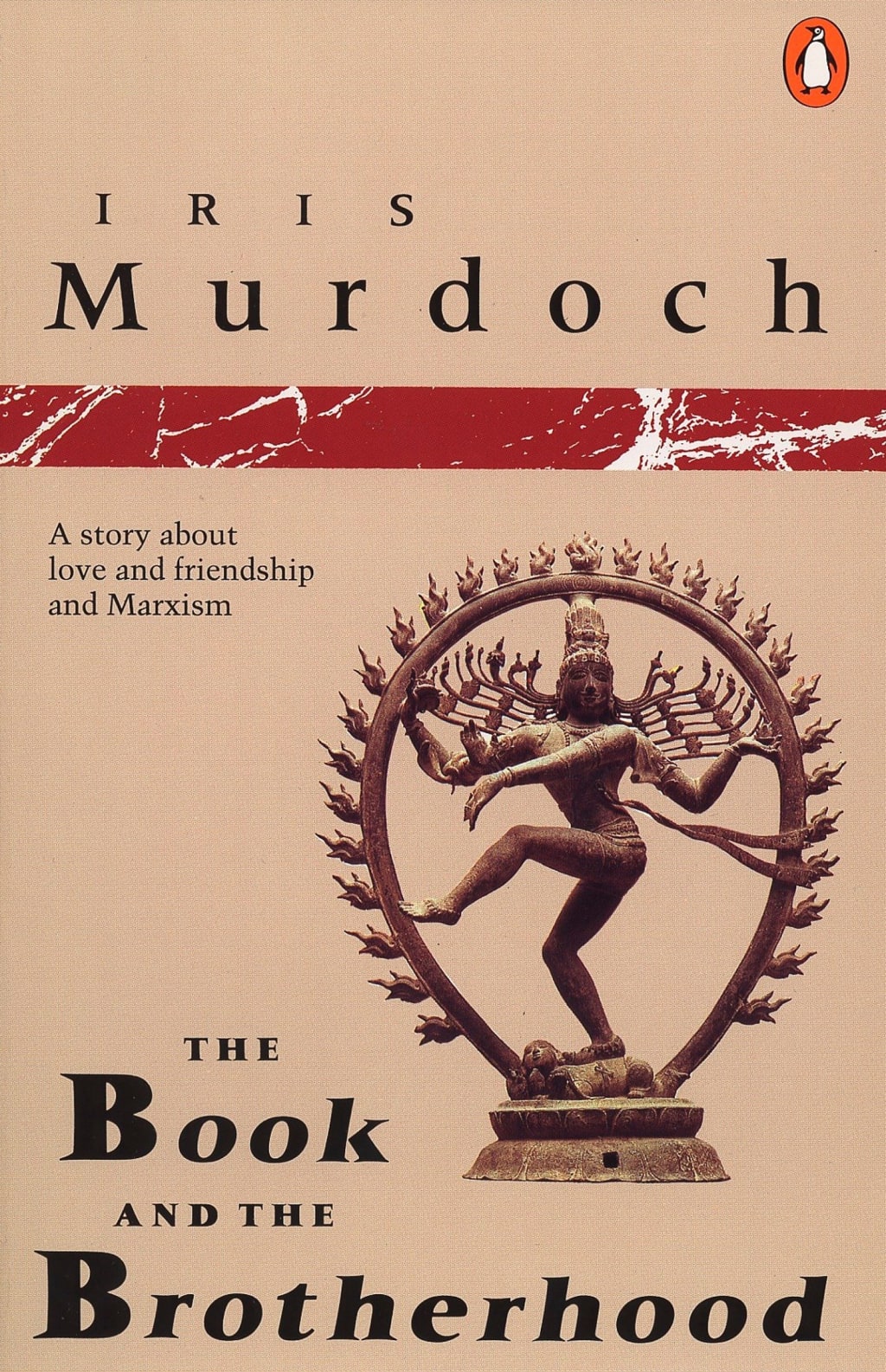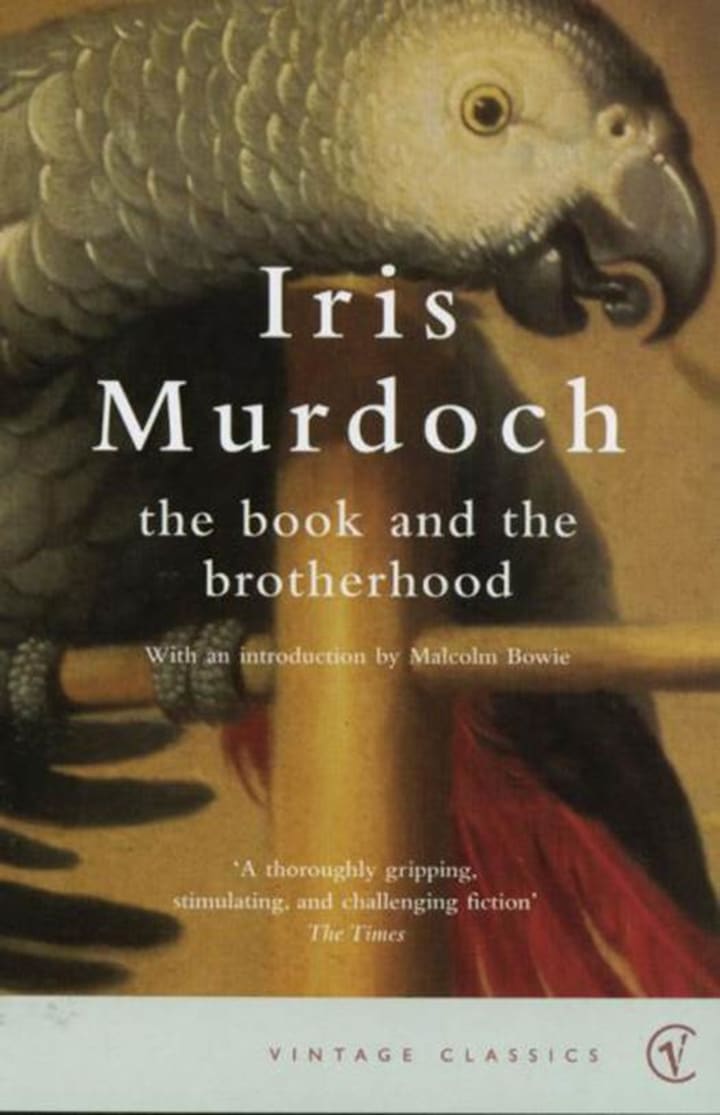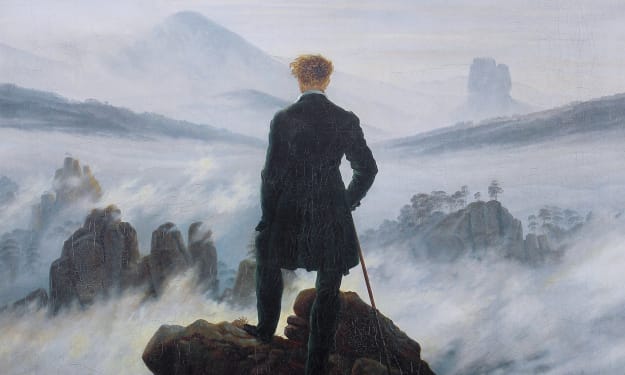"The Book and the Brotherhood" by Iris Murdoch
First Impressions (Pt.11)

Within this text there is a clear account of each character being tortured by three things: their identity, change and the past. The book represents the way in which the characters evolve through their understandings of themselves and the growth of each of their relationships. From the death of Gerard’s father to Tamar’s strange and aloof attitude - this book constructs character identities from their past experiences and gives the reader reason to believe that now that all is said and done, their lives are falling apart at the seams. Each and every one of them has an individual identity and yet, their identity is entirely different to what the reader believes of them after reading the book.
From the past, we have a hopeful but troubled character, then in the middle we have the present and the beginning of the book in which the character is conflicted about themselves and their relationships, but at the end of the book we have a character who is entirely different to the one we met at the start of the novel. Ultimately, we have a change of characters that are completely and entirely different to what we thought of them beforehand. This leads to the characters breaking down their relationships, realising that they were not meant to be with people that they had previously thought they were supposed to be with. It also leads to characters moving and migrating to other places in which they currently stand at the end of the book, realising that they were not meant to be in certain places or were pushed out.
Finally, we have characters that suffer terribly throughout the book and then, come out having suffered and attempt to make something of themselves. The only thing that is different about this book is that when the character does not succeed, and often they do not, the reader lacks sympathy for them because more often than most, they put themselves in the current position they are in. Struggling with their own identity, they all make a series of mistakes against each other, they then wish to change these situations but cannot accept the reality that trust is not regained overnight and finally, the reader learns aspects of their past that often shed light on the way they are throughout the novel. These are often conflicting, though politically charged, they stand as tortured artists, idealists gone wrong and revolutionaries who simply got too tired to carry on.
Gerard is the character with the biggest connection to his own past since it is his father that dies and his nostalgic mind that is impacted with the sorrow of this loss and not having ‘forgiven’ his father before death. When he arrives home, there is some sort of emptiness that comes out of his house, gives the reader atmosphere that leads us into the regret of his past:
“Now he was in his own house in Notting Hill, standing in the hall and listening. He did not call out. He hoped Patricia was asleep. The house, a fairly large detached brick-built villa, had belonged to Robin Topglass’s father, the bird man, then to Robin. For some time Robin and Gerard had lived in it together. Then when Robin got married and went to Canada he sold the house to Gerard…The house seemed to be waiting for Gerard, expecting something of him, that he would bring comfort, restore order, take charge. Yet also the house was a spectator, it was not all that involved, it was not a very old house, it was built in 1890, but it had already seen many things.” (p.53)
It is death that becomes the main focus of Gerard’s regret and throughout the rest of the book, he imagines images of his father’s death, becomes focused on the fact he cannot move on and this, in turn, will damage and destroy his relationship with Rose and other characters. It moves into a part of his identity and ultimately, he has no other option that to isolate himself emotionally:
“Gerard’s imagination engaged with the fact that Patricia had seen him die. Gerard had seen people dead but he had never seen anyone die. He thought, when it comes it is, isn’t it, so fast. Well, that must be true by definition, ‘fast’ doesn’t really apply. There just has to be a last moment. What we call a slow death is a slow dying. We may still picture the end as if it were a leap over a stream, but there is no stream and no one to leap. Just a last moment. Could one know, think ‘it will come in this minute?’ A condemned criminal could know. At that stage many of us are condemned criminals.” (p.55)
His focus tends to deteriorate his emotional being and thus, Gerard’s want to change is tainted by his attachment to the past. This proves that in the characters, if they attach themselves to the past, they are doomed to change their future for the worse. It comes at the price of their relationships and they will ultimately suffer greatly and psychologically throughout it. Emotionally guilt-ridden, it is still not possible to feel that much sympathy for them since their past hauntings are consumed by their self-inflicted problems:
“He thought of his father lying dead with his waxen alienated face, his high thinned nose and sunken chin, and pathetic open mouth, his poor defeated dead father, whose image was now and forever connected with the ghost of the grey parrot…And it was as if the parrot now before him understood, and felt sympathy and sorrow, while remaining, like a close and calm friend, detached, surveying but not swept into the dark poor of grief…” (p.216-17)
When it comes to remembrance, even Gerard cannot shake the negativity that his father left upon him before death. But when it comes to the fact that he did not forgive his father, his thoughts mellow and his feelings become sorrowful - more like the feelings he has towards the parrot than actually towards his father. Therefore, the reader can establish that there is an obvious connection between Gerard’s guilt over not forgiving his father and the way in which Gerard’s life deteriorates after the death of Grey the Parrot.

Gerard’s tortured past comes early on in the book when he visits Levquist and begins to think about the illness of his father before the death comes about. When he thinks about his past, there is often a feeling of regret and this yet, has nothing to do with his father. However, Gerard does regret a number of things in his past. Susceptible to this, Gerard later comes to regret his relationship with Rose and Rose, in turn, recognises that she spends a lot of her time and anxiety worrying about Gerard’s state of mind. When the reader encounters Gerard in the beginnings of the book, one of the first massive emotions that is described of him is his regret:
“Gerard got up and went to the shelves, knowing where to look, and as he touched the books he felt some fierce and agonising sense of the past. It’s gone, he thought, the past is irrevocable and beyond mending and far away, and yet it is here, blowing at one like a wind, I can feel it, I can smell it, and it’s so sad, so purely sad.” (p.23)
This is the point in which Gerard starts re-reading the Iliad in which Patroclus dies and Achilles weeps with the regret that he could do nothing about it. Gerard’s depression of this recedes into an analysis of the existentialist nature of the modern human being and he concludes that “Indeed there is nothing that breathes and crawls upon the earth more miserable than man.” (p.23) And, for his own self and how he changes and rearranges his grief throughout the book, he is absolutely correct and there is nothing he can do anymore. This hint gives a lot to the reader about the character development throughout the novel. This grief and regret slowly turns into pain, anguish and often, thoughtfulness on the human condition. He internalises many of his analytics about the existential side of the virtue of other people, meanwhile not really tending to his own and the relationship that deteriorates between him and Rose. It is a form of averting his guilt from himself:
“He doesn’t have to worry about virtue, thought Gerard, he lives a simple life devoid of temptation and remorse, he lives in decent simplifications, all he sees is a mass of particular sufferers - and of course he’s right about the mountain and how one cheats and by a leap into the ideal…” (p.248)
This does not only lead him to avert away from his own situation, but also to rely on his own thought for a practical analysis of a situation and since he is clearly still suffering from guilt and regret, this analysis cannot therefore be reliable as a source of his information on others. From the text, the reader can establish a vital link between the way in which Gerard sees other people and observes behaviours and the way in which these people visualise Gerard. Gerard’s analysis is more emotional, philosophical and has less of a stand in actual truths - just what he can see on the surface. Be that as it may, there is a strange way in which Gerard analysis morality, which is clearly something almost Nietzschian and often to do with the fact that religion should not be a factor when coming to analyse the reason for morality.
To conclude, Gerard is often the most complex and yet most grievous character of this novel, his relationship with Rose coming to a dramatic tense point in the midst of the novel due to his unhinging grief and debilitating emotional state which sends Rose into the midst of anxiety. From the beginning of the book in which he knows his father is sick and he drinks too much, the reader can definitely see a clear link between the ‘change’ in Gerard - which has a regretful link to his past and the fact that he could never, and still cannot, forgive his father completely.
Citation:
Murdoch, I (2003). The Book and the Brotherhood . 2nd ed. UK: Vintage Classics .
About the Creator
Annie Kapur
200K+ Reads on Vocal.
English Lecturer
🎓Literature & Writing (B.A)
🎓Film & Writing (M.A)
🎓Secondary English Education (PgDipEd) (QTS)
📍Birmingham, UK






Comments
There are no comments for this story
Be the first to respond and start the conversation.